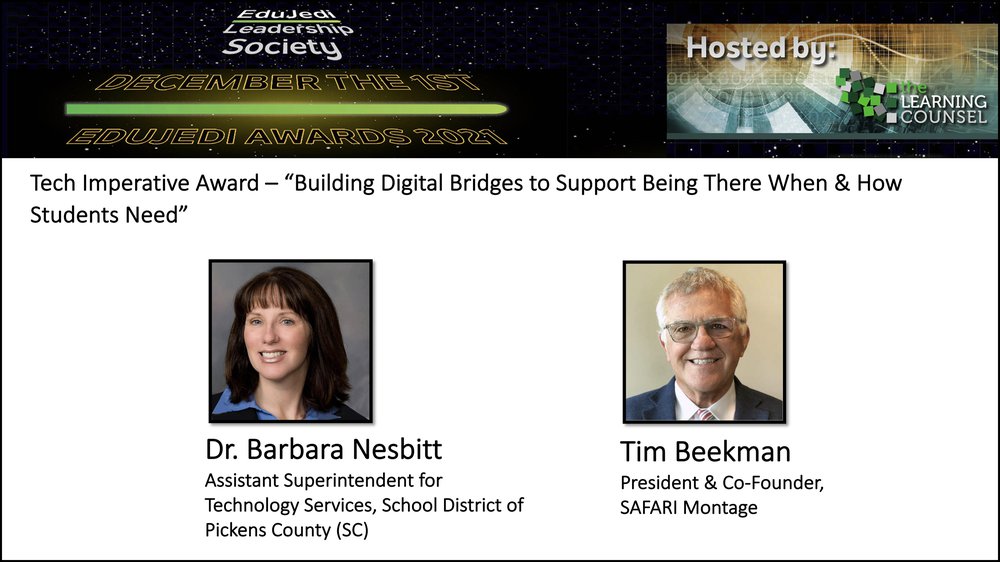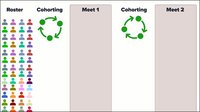This year’s Tech Imperative Award went to SAFARI Montage, ably represented in this video by Tim Beekman, their President and Co-Founder, and Dr. Barbara Nesbitt, Assistant Superintendent for Technology Services at the School District of Pickens County in South Carolina. According to Dr. Nesbitt, “One of the core values of the School District of Pickens County's choice. And COVID in some ways really helped us accelerate our goal to personalization in that we wanted to market the students’ ability to make choices that would drive their own success. We're an unusual district in that parents have complete control over their children's education here and they can pick their own schools. So, it's completely open school choice in the county; we also have magnet schools, a phenomenal Career and Technology Center, and over 30 advanced placement courses that you can take regardless of where you are physically located.
“We have WebEx rooms that we stream advanced placement courses from one school to another, with just excellent technology that makes it seem like kids are just right there. And in that kind of theme, we have purposely built our digital ecosystem to allow for this choice, this voice, this personalization of learning. And this started a little over six years ago and we also have ClassLink as our student portal, our entryway, our single sign on; we use Schoology as a learning management system. Power school is our state provided student information system. So, the whole state has power school and our learning object repository is SAFARI Montage. And we've been using that for over a decade.
This ecosystem is designed to give choice so that however teachers want to use high quality, digital web applications and high-quality learning assets to build lessons and units of instruction. We want to make it easy for the teachers to get there. Some folks go right to Schoology, and they bypass class line call together. And you can see Schoology logins, um, are about 70% of our staff or our, our students regularly use Schoology. And again, if you were taking dual enrollment courses or you are enrolled in our virtual academy, you would not be using Schoology.
“And then this is safari in montage. So, you can see here that safari montage gets, um, just hundreds of thousands of logins, just this school year alone and plays of individual assets. And almost 9,000 plays from playlists. We have standard aligned plays. We have a lot of uploads. What's so great about our learning object repository is that teachers can go directly to SAFARI. They can have students do research inside of SAFARI, like a safe Google. They can also build purposefully from the digital assets that are in SAFARI Montage into their learning management system. And I'm saying all of this and just kind of go back and let you see this. We're okay with teachers and students kind of choosing their entry way in to the digital applications. But what we want to do is give our teachers some choice and voice, not only into how they use the digital applications, but in some ways what those digital tools are.
In today’s world, safety is key to your district’s use of digital assets. According to Tim Beekman, “How do you take data analytics time into an ed-fi or an IEEE, virtual reality standards that have just come out, which are fantastic? How do you take them into the IMS standard so that they are trusted apps, so that as a district or as a state, the apps you put into this system are trusted, they're secure, they're going to work? It's not trusted, it's not here. We can't put it on anymore. The world's different. If you look at the number of ransomwares that happened in K-12, they're up over a thousand percent last year and projected to be up over a thousand percent again this year, those numbers are staggering. And part of the issue from a vendor standpoint is how do you take every district with a different security agreement and just get things done so that everybody's taken care of?











